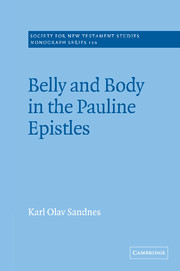Book contents
- Frontmatter
- Contents
- Preface
- Abbreviations
- Part 1 Prolegomena
- Part 2 The Graeco-Roman belly
- Part 3 The appropriated belly
- Part 4 Belly-worship and body according to Paul
- Part 5 The earliest expositors of Paul
- Part 6 Conclusions
- Bibliography
- Index of modern authors
- Index of Graeco-Roman sources
- Index of Old Testament, Apocrypha, Pseudepigrapha and other Jewish writings
- Index of New Testament and early Christian writings
Part 3 - The appropriated belly
Published online by Cambridge University Press: 22 September 2009
- Frontmatter
- Contents
- Preface
- Abbreviations
- Part 1 Prolegomena
- Part 2 The Graeco-Roman belly
- Part 3 The appropriated belly
- Part 4 Belly-worship and body according to Paul
- Part 5 The earliest expositors of Paul
- Part 6 Conclusions
- Bibliography
- Index of modern authors
- Index of Graeco-Roman sources
- Index of Old Testament, Apocrypha, Pseudepigrapha and other Jewish writings
- Index of New Testament and early Christian writings
Summary
Although the ancient world cannot be divided into Judaism and Hellenism as two easily separated parts, it is still interesting to see how topoi appearing most frequently in Graeco-Roman sources are appropriated into biblical thought. The aim of this chapter is to see how the philosophical discussions on mastery of passions, and the belly in particular, have been enculturated into a Jewish-biblical setting. In other words, we approach Paul by seeking a bridge in this material. This is not to deny that there are texts of interest and relevance in Old Testament and Jewish sources as well. Before proceeding to address the appropriation in particular, we will consider the most relevant analogies in this material.
In the Old Testament, the enemies or the ungodly are described in the metaphor of an ‘open mouth’ or in terms of devouring. In some texts this refers to deceitful speech (e.g Ps. 10:3–5, 7/LXX 11:3–5 and 9:28), but usually it is a reference to their greedy nature or appetite (Ps. 22:14/LXX 21:14, cf. Ps. 73:4–6/LXX 72:4–6; Prov. 19:28; Job 20:12–15; Micah 3:2–3): their mouth is open to devour, like a wild animal. In a description of the ungodly, he is presented as a devouring enemy, swallowing the righteous as bread (Ps. 53:5 = 14:4/LXX 52:5 = 13:4, cf. 5:10). To the righteous who has put his trust in God, the enemy is a glutton ready to consume them (Ps. 27:2/LXX 26:2).
- Type
- Chapter
- Information
- Belly and Body in the Pauline Epistles , pp. 95 - 96Publisher: Cambridge University PressPrint publication year: 2002



